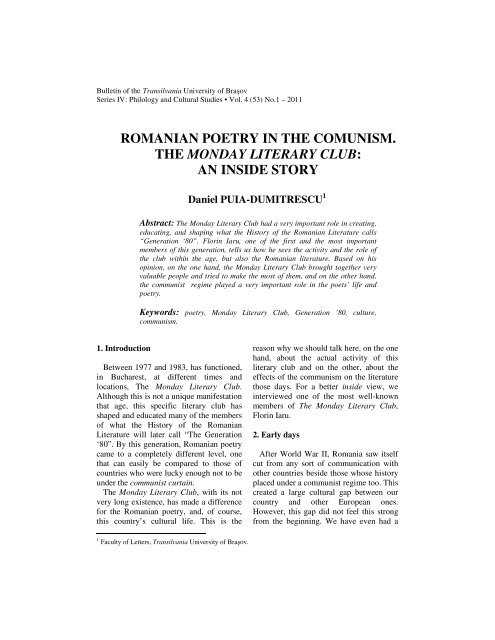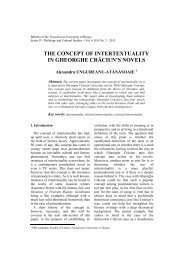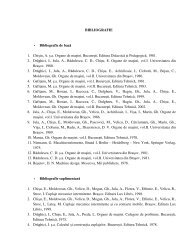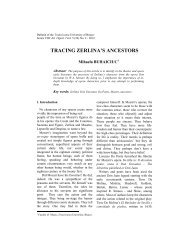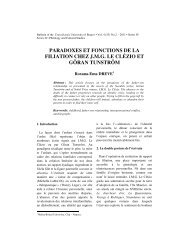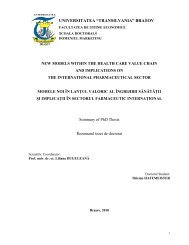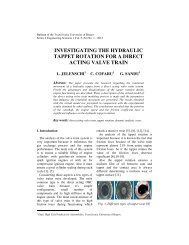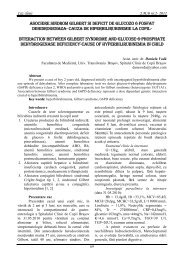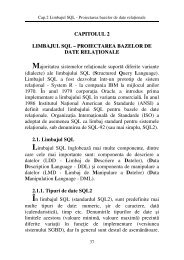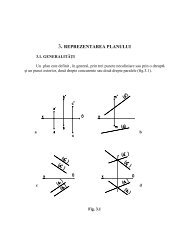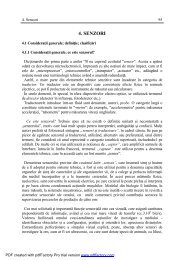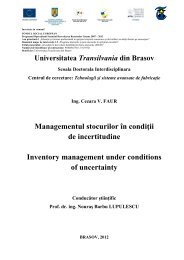romanian poetry in the comunism. the monday literary club
romanian poetry in the comunism. the monday literary club
romanian poetry in the comunism. the monday literary club
Create successful ePaper yourself
Turn your PDF publications into a flip-book with our unique Google optimized e-Paper software.
Bullet<strong>in</strong> of <strong>the</strong> Transilvania University of Braşov<br />
Series IV: Philology and Cultural Studies • Vol. 4 (53) No.1 – 2011<br />
ROMANIAN POETRY IN THE COMUNISM.<br />
THE MONDAY LITERARY CLUB:<br />
AN INSIDE STORY<br />
Daniel PUIA-DUMITRESCU 1<br />
Abstract: The Monday Literary Club had a very important role <strong>in</strong> creat<strong>in</strong>g,<br />
educat<strong>in</strong>g, and shap<strong>in</strong>g what <strong>the</strong> History of <strong>the</strong> Romanian Literature calls<br />
“Generation ‘80”. Flor<strong>in</strong> Iaru, one of <strong>the</strong> first and <strong>the</strong> most important<br />
members of this generation, tells us how he sees <strong>the</strong> activity and <strong>the</strong> role of<br />
<strong>the</strong> <strong>club</strong> with<strong>in</strong> <strong>the</strong> age, but also <strong>the</strong> Romanian literature. Based on his<br />
op<strong>in</strong>ion, on <strong>the</strong> one hand, <strong>the</strong> Monday Literary Club brought toge<strong>the</strong>r very<br />
valuable people and tried to make <strong>the</strong> most of <strong>the</strong>m, and on <strong>the</strong> o<strong>the</strong>r hand,<br />
<strong>the</strong> communist regime played a very important role <strong>in</strong> <strong>the</strong> poets’ life and<br />
<strong>poetry</strong>.<br />
Keywords: <strong>poetry</strong>, Monday Literary Club, Generation ’80, culture,<br />
communism.<br />
1. Introduction<br />
Between 1977 and 1983, has functioned,<br />
<strong>in</strong> Bucharest, at different times and<br />
locations, The Monday Literary Club.<br />
Although this is not a unique manifestation<br />
that age, this specific <strong>literary</strong> <strong>club</strong> has<br />
shaped and educated many of <strong>the</strong> members<br />
of what <strong>the</strong> History of <strong>the</strong> Romanian<br />
Literature will later call “The Generation<br />
‘80”. By this generation, Romanian <strong>poetry</strong><br />
came to a completely different level, one<br />
that can easily be compared to those of<br />
countries who were lucky enough not to be<br />
under <strong>the</strong> communist curta<strong>in</strong>.<br />
The Monday Literary Club, with its not<br />
very long existence, has made a difference<br />
for <strong>the</strong> Romanian <strong>poetry</strong>, and, of course,<br />
this country’s cultural life. This is <strong>the</strong><br />
reason why we should talk here, on <strong>the</strong> one<br />
hand, about <strong>the</strong> actual activity of this<br />
<strong>literary</strong> <strong>club</strong> and on <strong>the</strong> o<strong>the</strong>r, about <strong>the</strong><br />
effects of <strong>the</strong> communism on <strong>the</strong> literature<br />
those days. For a better <strong>in</strong>side view, we<br />
<strong>in</strong>terviewed one of <strong>the</strong> most well-known<br />
members of The Monday Literary Club,<br />
Flor<strong>in</strong> Iaru.<br />
2. Early days<br />
After World War II, Romania saw itself<br />
cut from any sort of communication with<br />
o<strong>the</strong>r countries beside those whose history<br />
placed under a communist regime too. This<br />
created a large cultural gap between our<br />
country and o<strong>the</strong>r European ones.<br />
However, this gap did not feel this strong<br />
from <strong>the</strong> beg<strong>in</strong>n<strong>in</strong>g. We have even had a<br />
1 Faculty of Letters, Transilvania University of Braşov.
124<br />
Bullet<strong>in</strong> of <strong>the</strong> Transilvania University of Braşov. Series IV • Vol. 4 (53) No.1 - 2011<br />
more relaxed period – regard<strong>in</strong>g not only<br />
culture, <strong>in</strong> which we are specifically<br />
<strong>in</strong>terested here – after Ceauşescu’s first<br />
years as a leader, but this did not last too<br />
much, and <strong>the</strong> situation went back to <strong>the</strong><br />
one before his arrival as a president. The<br />
situation got even worse <strong>in</strong> <strong>the</strong> ‘80’s.<br />
Regard<strong>in</strong>g <strong>the</strong> cultural life, this was<br />
reduced to m<strong>in</strong>imum – and even so, <strong>the</strong><br />
Communist Party was try<strong>in</strong>g to keep it not<br />
only under control, but also under a<br />
complete surveillance. But, of course, it is<br />
not everyth<strong>in</strong>g dark and sad about Romanian<br />
culture that age. There were quite a few<br />
places where Romanian writers could meet<br />
and stay active, maybe with just a little bit<br />
more care and some compromises.<br />
One strong and important meet<strong>in</strong>g place<br />
for those mentioned above was <strong>the</strong><br />
“Junimea” Literary Club, lead by Ov. S.<br />
Crohmalniceanu. Its only problem was – for<br />
<strong>the</strong> poets – that it focused on prose. This is<br />
why it felt <strong>the</strong> need for a <strong>club</strong> which should<br />
focus on <strong>poetry</strong>. Therefore <strong>the</strong> idea of a<br />
Poetry Literary Club came to people’s<br />
m<strong>in</strong>ds.<br />
Flor<strong>in</strong> Iaru tells us: “Around 1976, we<br />
were try<strong>in</strong>g to get toge<strong>the</strong>r <strong>in</strong> a more<br />
professional place, not because “Junimea”<br />
– coord<strong>in</strong>ated by Ov. S. Crohmalniceanu –<br />
wouldn’t have been good enough for us,<br />
but this <strong>literary</strong> <strong>club</strong>’s focus was on <strong>the</strong><br />
prose and, as naughty youngsters as we<br />
were, we were th<strong>in</strong>k<strong>in</strong>g we are not actually<br />
understood… The most <strong>in</strong>trigued was<br />
Radu Cal<strong>in</strong> Cristea. His <strong>the</strong>ory was that we<br />
have to “take cover” somehow. This was<br />
<strong>the</strong> reason for br<strong>in</strong>g<strong>in</strong>g to discussion <strong>the</strong><br />
name of <strong>the</strong> vice-dean, Hanţă, but this<br />
character was too narrow-m<strong>in</strong>ded… Then<br />
it came to us <strong>the</strong> name of Dodu-Balan (Oh,<br />
my God!)… Thank God, <strong>the</strong>se two thought<br />
we were not only some modernistic pricks,<br />
but also with no talent or perspective, and<br />
somehow dumb. This way we came to<br />
Nicolae Manolescu. It seems that <strong>in</strong> his<br />
job’s description from <strong>the</strong> dean’s office he<br />
had also <strong>the</strong> obligation of work<strong>in</strong>g with<br />
problematic youth. And this is how it<br />
stayed. But fur<strong>the</strong>r my memory could play<br />
me some tricks: some say it started on <strong>the</strong><br />
3 rd of March, o<strong>the</strong>rs, on <strong>the</strong> 4 th , same<br />
month, same year, or same time with <strong>the</strong><br />
earthquake…” 1<br />
Asked if this k<strong>in</strong>d of an event was a<br />
trend that age, Flor<strong>in</strong> Iaru answered:<br />
“There was more <strong>the</strong> need of identity, <strong>the</strong>n<br />
a trend. There was <strong>the</strong> impression of<br />
someth<strong>in</strong>g new, <strong>in</strong>novat<strong>in</strong>g, a Romanian<br />
feel<strong>in</strong>g, not one of <strong>the</strong> Romanian be<strong>in</strong>g,<br />
but of Romanian <strong>poetry</strong>. And <strong>the</strong>re was <strong>the</strong><br />
need for discussions, for th<strong>in</strong>k<strong>in</strong>g, for<br />
strategy, for friendship. Once aga<strong>in</strong>, it felt<br />
like <strong>the</strong> firefight<strong>in</strong>g way of <strong>the</strong> official so<br />
called <strong>literary</strong> <strong>club</strong>s, <strong>the</strong> well-known way<br />
of th<strong>in</strong>k<strong>in</strong>g of this age couldn’t understand<br />
what we were do<strong>in</strong>g.” 2<br />
The Romanian poet, Andrei Bodiu, also<br />
talks about this: “<strong>the</strong> literature of <strong>the</strong><br />
<strong>literary</strong> <strong>club</strong>s, ei<strong>the</strong>r <strong>in</strong> Bucharest, or <strong>in</strong><br />
Iassy, Timisoara, Cluj and Brasov, had<br />
become more and more important. Not<br />
only because it was a reason for writers’<br />
meet<strong>in</strong>g, but also because it was <strong>the</strong> f<strong>in</strong>al<br />
form of communicat<strong>in</strong>g literature that<br />
age.” 3<br />
This k<strong>in</strong>d of events started be<strong>in</strong>g very<br />
popular that period, partly because of <strong>the</strong><br />
value of <strong>the</strong>ir members, but partly also for<br />
<strong>the</strong> “breath of fresh air” <strong>the</strong>y brought <strong>in</strong>to a<br />
very difficult period of oppression and<br />
censorship. This is why <strong>literary</strong> <strong>club</strong>s like<br />
The Monday Literary Club, Junimea, but –<br />
even more – <strong>the</strong> well-known (but, pitifully,<br />
not from <strong>the</strong> same reasons, regard<strong>in</strong>g<br />
value) Adrian Paunescu’s Flacara<br />
ga<strong>the</strong>red toge<strong>the</strong>r even hundreds of people.<br />
This is why we asked Flor<strong>in</strong> Iaru if this<br />
sort of event could still be called a “<strong>literary</strong><br />
<strong>club</strong>”. His reply was: “We have always<br />
called it a <strong>literary</strong> <strong>club</strong>. Strange enough,<br />
<strong>the</strong>re was at least one good read<strong>in</strong>g for<br />
each meet<strong>in</strong>g; and this for a whole year. Or<br />
two… How many were we <strong>in</strong> <strong>the</strong>
D. PUIA-DUMITRESCU: Romanian Poetry <strong>in</strong> <strong>the</strong> Communism: An Inside Story 125<br />
beg<strong>in</strong>n<strong>in</strong>g? I don’t know, twenty? Then<br />
<strong>the</strong> numbers went quickly to forty or fifty.<br />
We were never more than seventy. These<br />
were <strong>the</strong> numbers. We were advertis<strong>in</strong>g it.<br />
We were very proud for <strong>the</strong> feel<strong>in</strong>g that<br />
someth<strong>in</strong>g is happen<strong>in</strong>g.” 4 The need for<br />
someth<strong>in</strong>g new, for someth<strong>in</strong>g different<br />
than <strong>the</strong> Communist Party’s way of see<strong>in</strong>g<br />
th<strong>in</strong>gs is one of <strong>the</strong> reasons that made this<br />
k<strong>in</strong>d of movements so popular.<br />
Flor<strong>in</strong> Iaru is talk<strong>in</strong>g about what was<br />
go<strong>in</strong>g on at a <strong>club</strong> meet<strong>in</strong>g, <strong>the</strong> actively<br />
<strong>in</strong>volved participants, <strong>the</strong> real disputes<br />
over texts, and <strong>the</strong>ir cont<strong>in</strong>uation long after<br />
<strong>the</strong> meet<strong>in</strong>gs were ended: “There were<br />
go<strong>in</strong>g on th<strong>in</strong>gs like those which go on<br />
when everyth<strong>in</strong>g goes on right. Basically,<br />
<strong>the</strong>re were three read<strong>in</strong>gs. Then <strong>the</strong><br />
miracle: excellent, cutt<strong>in</strong>g-edge,<br />
discussions. We were constantly learn<strong>in</strong>g<br />
to be logical, sharp, tak<strong>in</strong>g <strong>in</strong>to account <strong>the</strong><br />
most important books (not necessarily<br />
those com<strong>in</strong>g from <strong>the</strong> structuralism), <strong>the</strong><br />
liv<strong>in</strong>g feel<strong>in</strong>g of <strong>the</strong> affiliation to <strong>the</strong> great<br />
<strong>poetry</strong>. The discussions were professional<br />
– and because of this, without gloves.<br />
There was some k<strong>in</strong>d of greatness. And all<br />
<strong>the</strong>se were possible because <strong>the</strong>re were<br />
around twenty poets, each one with a<br />
strong voice. Obviously, we took <strong>the</strong><br />
discussions over to a dr<strong>in</strong>k, wherever we<br />
could f<strong>in</strong>d a pub open after ten <strong>in</strong> <strong>the</strong><br />
even<strong>in</strong>g. One couldn’t have enough at <strong>the</strong><br />
<strong>literary</strong> <strong>club</strong>. That was only for starters. It<br />
was followed by <strong>the</strong> uncerta<strong>in</strong> discussions,<br />
by <strong>the</strong> exploration, <strong>the</strong> explanation, or <strong>the</strong><br />
s<strong>in</strong>cere demolition. Make no illusions. We<br />
were uncerta<strong>in</strong>. And only <strong>the</strong> uncerta<strong>in</strong>ty is<br />
creative.” 5<br />
3. Mentorship and creativity<br />
As Flor<strong>in</strong> Iaru said above, <strong>the</strong> Romanian<br />
poets ga<strong>the</strong>red toge<strong>the</strong>r with <strong>the</strong> purpose of<br />
creat<strong>in</strong>g a <strong>poetry</strong>-focused <strong>literary</strong> <strong>club</strong><br />
have looked for a coord<strong>in</strong>ator for quite a<br />
while. They have tried to f<strong>in</strong>d him at <strong>the</strong><br />
Faculty of Letters <strong>in</strong> Bucharest, and <strong>the</strong>n<br />
anywhere else one man like this could be<br />
found. In <strong>the</strong> end, <strong>the</strong>y did not f<strong>in</strong>d only a<br />
coord<strong>in</strong>ator, but also, and even more<br />
important, a mentor – Nicolae Manolescu.<br />
He “was a very good mentor. Tons of<br />
op<strong>in</strong>ions have been written on this subject.<br />
I started th<strong>in</strong>k<strong>in</strong>g that Manolescu first<br />
came because he had no choice. And <strong>the</strong>n<br />
he stayed because <strong>the</strong>re were very good<br />
texts read. He asked some of <strong>the</strong> brilliant<br />
m<strong>in</strong>ds of <strong>the</strong> Romanian culture to come<br />
and listen to what was read <strong>the</strong>re. He<br />
wanted to share what he discovered; or<br />
what discovered him. Then he was really<br />
surprised to f<strong>in</strong>d an already built critical<br />
language, unprecedented fact – at least<br />
among those of his contemporary <strong>literary</strong><br />
world. This was what he enjoyed <strong>the</strong> most,<br />
I th<strong>in</strong>k, altoge<strong>the</strong>r with <strong>the</strong> conviction he<br />
had encountered a ve<strong>in</strong> of poets which<br />
only if you are very lucky you can meet.<br />
He was very well-balanced when it came<br />
about judg<strong>in</strong>g; and also very careful.<br />
Although we respected him as a th<strong>in</strong> lipped<br />
idol, <strong>the</strong>re was no hesitation when <strong>the</strong>re<br />
was a reason for battl<strong>in</strong>g him. I suppose<br />
those times someth<strong>in</strong>g fundamental<br />
changed <strong>in</strong>to his way of th<strong>in</strong>k<strong>in</strong>g, and he<br />
enjoyed see<strong>in</strong>g that. He had someth<strong>in</strong>g that<br />
belonged only to him – a <strong>literary</strong> <strong>club</strong><br />
resembl<strong>in</strong>g to <strong>the</strong> “Junimea” or <strong>the</strong><br />
“Sburătorul”. On a daily basis, we agreed<br />
and <strong>the</strong>n laughed out loud. I also th<strong>in</strong>k that<br />
period was <strong>the</strong> time when we laughed <strong>the</strong><br />
most, <strong>the</strong> best and <strong>the</strong> healthiest <strong>in</strong> <strong>the</strong><br />
Romanian literature. I should specify: we<br />
didn’t necessarily laugh to stupid th<strong>in</strong>gs,<br />
but mostly to <strong>the</strong> good ones, those which<br />
transgressed <strong>the</strong> serious monopole of <strong>the</strong><br />
“great” literature.” 6<br />
Nicolae Manolescu himself, <strong>in</strong> an<br />
<strong>in</strong>terview with <strong>the</strong> “Observator cultural”,<br />
talks about <strong>the</strong> difficult period when <strong>the</strong><br />
Romanian Generation ’80 came to light:<br />
“The Generation ’80 made her way <strong>in</strong> a<br />
time of extremely difficult conditions.
126<br />
Bullet<strong>in</strong> of <strong>the</strong> Transilvania University of Braşov. Series IV • Vol. 4 (53) No.1 - 2011<br />
Unlike <strong>the</strong> writers of <strong>the</strong> 60’s, who were<br />
lucky enough to be <strong>the</strong> witnesses of a<br />
liberalization decade and entered <strong>the</strong> front<br />
door, <strong>the</strong>y had to enter <strong>the</strong> back door, and<br />
had to live <strong>the</strong> darkest communist decade <strong>in</strong><br />
our country. This fact <strong>in</strong>fluenced <strong>the</strong>m, <strong>the</strong>ir<br />
states of m<strong>in</strong>d, and – generally speak<strong>in</strong>g –<br />
<strong>the</strong>ir literature: many did not have <strong>the</strong>ir<br />
<strong>literary</strong> debut when it should have been,<br />
many have not published <strong>the</strong> books <strong>the</strong>y<br />
should have had when <strong>the</strong>y should have<br />
had 7 .” But despite all <strong>the</strong>se problems,<br />
Manolescu helped <strong>the</strong>m as much as he<br />
could, and <strong>in</strong> <strong>the</strong> end, <strong>the</strong>y have succeeded.<br />
This is also part of <strong>the</strong> role of a mentor – to<br />
help his disciples com<strong>in</strong>g to light.<br />
Therefore, <strong>the</strong> poets have struggled for a<br />
<strong>literary</strong> <strong>club</strong> of <strong>the</strong>ir own, for a mentor,<br />
and for a different, a revolutionary way of<br />
writ<strong>in</strong>g. Was <strong>the</strong>re a trend <strong>the</strong>y have<br />
created? Was <strong>the</strong>re one of <strong>the</strong> participants’<br />
<strong>in</strong>fluence more important? Flor<strong>in</strong> Iaru<br />
says: “There was and <strong>the</strong>re wasn’t. Let’s<br />
take <strong>the</strong>m one at a time. The one who<br />
succeeded one even<strong>in</strong>g was celebrated like<br />
a hero. He was quoted, but not imitated.<br />
Because <strong>the</strong>re were at least as many<br />
directions as <strong>the</strong>re were good poets.<br />
Therefore, we are not talk<strong>in</strong>g about a trend.<br />
It was a common idea, <strong>in</strong>stead: that <strong>poetry</strong><br />
has to be written <strong>in</strong> <strong>the</strong> city, with what <strong>the</strong><br />
client br<strong>in</strong>gs, sometimes even from<br />
sentences of <strong>the</strong> classics; that it represents<br />
<strong>the</strong> new sensibility (a term first used by<br />
Traian T. Coşovei); that language is<br />
obscure, but also transparent, but that <strong>the</strong><br />
expression has to stay memorable. Today,<br />
after 30 years, one can see better than now<br />
that you couldn’t mix <strong>the</strong> poets up. (That<br />
was <strong>the</strong> most important traditionalist or<br />
official critique – that we are<br />
Americanized, that we make fun of<br />
everyth<strong>in</strong>g and at all times.) We were<br />
hav<strong>in</strong>g fun with great verses which have<br />
nowadays almost completely lost <strong>the</strong>ir joy:<br />
Stratan, Muş<strong>in</strong>a, and Vişniec... Each one<br />
had his moment of glory exactly when<br />
<strong>the</strong>y didn’t expect it.” 8 If we look back –<br />
or even if we take <strong>the</strong> contemporary<br />
Romanian <strong>poetry</strong> – <strong>the</strong>y should have<br />
been trend setters, and <strong>the</strong>re is noth<strong>in</strong>g<br />
wrong about this. Actually, we<br />
cont<strong>in</strong>ued, and asked Flor<strong>in</strong> Iaru about<br />
his own perception regard<strong>in</strong>g o<strong>the</strong>rs’<br />
<strong>poetry</strong>, and <strong>the</strong> connections between him<br />
and o<strong>the</strong>r members of The Monday<br />
Literary Club: “In <strong>the</strong> beg<strong>in</strong>n<strong>in</strong>g, as any<br />
teen, I had a better perception of my own<br />
<strong>poetry</strong>. Then <strong>the</strong> stars’: Vasile Poenaru,<br />
D<strong>in</strong>u Adam, Katia Fodor, Mihai Peniuc,<br />
and many o<strong>the</strong>rs. I was dream<strong>in</strong>g to be like<br />
<strong>the</strong>m, so <strong>the</strong>y were an example for me.<br />
That was why I was always look<strong>in</strong>g for<br />
new <strong>the</strong>mes, situations, and metaphors.<br />
Afterwards, when <strong>in</strong> my twenties, I started<br />
see<strong>in</strong>g <strong>poetry</strong> differently. I started see<strong>in</strong>g<br />
<strong>the</strong> great, <strong>the</strong> modern <strong>poetry</strong>. Only when I<br />
read E. A. Poe’s “The Philosophy of<br />
Composition” on <strong>the</strong> creation of “The<br />
Raven”, I came to see some <strong>the</strong>oretical<br />
light. Surrounded by contemporary <strong>poetry</strong>,<br />
and sunk <strong>in</strong>to <strong>the</strong> same wash-bowl of<br />
ideas, I learned how to see <strong>the</strong> difference.<br />
Those times, good verses stuck to my<br />
m<strong>in</strong>d. It was a sort of a boil<strong>in</strong>g pot: we<br />
were read<strong>in</strong>g <strong>poetry</strong> to each o<strong>the</strong>r at <strong>the</strong><br />
Capşa, Trocadero, or Union (don’t you<br />
th<strong>in</strong>k we’ve had money: 3 lei for a coffee<br />
and a beer – for <strong>the</strong> entire day), we were<br />
literally jump<strong>in</strong>g for joy for a good verse,<br />
and if <strong>the</strong>re was a whole poem I liked, I<br />
would’ve left home determ<strong>in</strong>ed to write a<br />
better one. It was a sort of a socialist<br />
competition: who’s br<strong>in</strong>g<strong>in</strong>g <strong>the</strong> best poem<br />
of <strong>the</strong> day?” 9<br />
Ano<strong>the</strong>r important member of The<br />
Monday Literary Club, from its early<br />
days, Mircea Cărtărescu, talks about <strong>the</strong><br />
goal of his generation’s <strong>poetry</strong>: “A more<br />
s<strong>in</strong>cere, more humane <strong>poetry</strong>, least<br />
conventional, more open-m<strong>in</strong>ded to <strong>the</strong><br />
existence and style, and last, but not<br />
least, a little bit more read<strong>in</strong>g-friendly –<br />
this is what we were look<strong>in</strong>g for.” 10
D. PUIA-DUMITRESCU: Romanian Poetry <strong>in</strong> <strong>the</strong> Communism: An Inside Story 127<br />
4. Communist <strong>in</strong>fluence<br />
The communist Romania was not <strong>the</strong> best<br />
place to be, but – for a poet – nei<strong>the</strong>r <strong>the</strong><br />
worst. This is because of <strong>the</strong> fact that <strong>the</strong><br />
worst situations could become <strong>the</strong> most<br />
fertile ones when it comes about creativity.<br />
We asked <strong>the</strong> poet about <strong>the</strong> role of <strong>the</strong><br />
communism <strong>in</strong> his evolution, and about <strong>the</strong><br />
frequent presence of <strong>the</strong> Special Services at<br />
<strong>the</strong> <strong>club</strong> meet<strong>in</strong>gs. He replied: “Do you want<br />
to talk about <strong>the</strong> role? It had <strong>the</strong> most<br />
important role. Like <strong>the</strong> most important role<br />
of a guardian <strong>in</strong> his prisoner’s life. About<br />
<strong>the</strong> surveillance – we sort of knew about it.<br />
What could we actually do? We laughed. It<br />
was a threaten<strong>in</strong>g, but <strong>in</strong>ferior presence. One<br />
cannot escape fear, but by laugh<strong>in</strong>g. I<br />
remember that, <strong>in</strong> 1985, when <strong>the</strong>y were<br />
already keep<strong>in</strong>g an eye on me, I gave a book<br />
(a man has to hope, o<strong>the</strong>rwise why is he<br />
human?) which came back with a no answer<br />
and with <strong>the</strong> advice to behave. Mircea<br />
Nedelciu made <strong>the</strong> best compliment for me:<br />
“I thought you will back off and spoil your<br />
book (he was talk<strong>in</strong>g about “I’m go<strong>in</strong>g nuts<br />
and I’m sorry”). Well done!” 11<br />
Andrei Bodiu comes with an <strong>in</strong>terest<strong>in</strong>g<br />
view over this period and <strong>the</strong> communist<br />
<strong>in</strong>fluence: “<strong>the</strong> literature of <strong>the</strong> 80’s is<br />
about affirm<strong>in</strong>g values completely<br />
different from <strong>the</strong> official ones. Here we<br />
could talk about <strong>the</strong> idea of <strong>in</strong>dividual and<br />
<strong>in</strong>dividuality opposed to collectivism.<br />
Apparently paradoxical, <strong>the</strong> members of<br />
this generation proved <strong>the</strong>mselves a solid<br />
group <strong>in</strong> affirm<strong>in</strong>g <strong>in</strong>dividuality, <strong>in</strong><br />
affirm<strong>in</strong>g identity. None<strong>the</strong>less talk<strong>in</strong>g<br />
about <strong>the</strong> self, about me, was a revolution<br />
compared to <strong>the</strong> official ideology which<br />
was all about <strong>the</strong> idea of a one body, one<br />
will country. By plac<strong>in</strong>g <strong>the</strong> <strong>in</strong>dividual –<br />
with his fears and dreams – <strong>in</strong> <strong>the</strong> <strong>literary</strong><br />
foreground, was a subversive action.<br />
Never<strong>the</strong>less, <strong>the</strong> new attitude, opposed to<br />
<strong>the</strong> communism, did not become, but later<br />
and isolated, action aga<strong>in</strong>st Nicolae<br />
Ceauşescu’s despotic regime.” 12<br />
5. Conclusions<br />
The Monday Literary Club is not only an<br />
important event for <strong>the</strong> Romanian<br />
literature <strong>in</strong> <strong>the</strong> communist regime, but<br />
also – or even more important – one of <strong>the</strong><br />
turn<strong>in</strong>g po<strong>in</strong>ts of <strong>the</strong> history of <strong>the</strong><br />
Romanian literature.<br />
We th<strong>in</strong>k that Flor<strong>in</strong> Iaru’s <strong>in</strong>side view<br />
made us understand better <strong>the</strong> two<br />
directions we said we will follow through<br />
this article – <strong>the</strong> activity of The Monday<br />
Literary Club and <strong>the</strong> communist <strong>in</strong>fluence<br />
over <strong>the</strong> literature of <strong>the</strong> period.<br />
Acknowledgements<br />
This paper is supported by <strong>the</strong> Sectoral<br />
Operational Programme Human Resources<br />
Development (SOP HRD), ID76945<br />
f<strong>in</strong>anced from <strong>the</strong> European Social Fund<br />
and by <strong>the</strong> Romanian Government.<br />
Notes<br />
1<br />
2<br />
3<br />
4<br />
5<br />
6<br />
7<br />
8<br />
9<br />
10<br />
Daniel, Puia-Dumitrescu: Interview with<br />
Flor<strong>in</strong> Iaru, manuscript.<br />
Idem.<br />
Andrei, Bodiu, Direcţia optzeci în poezia<br />
română (Direction ‚80 with<strong>in</strong> <strong>the</strong><br />
Romanian Poetry), Piteşti, Paralela 45<br />
Publish<strong>in</strong>g House, 2000, p. 21.<br />
Daniel, Puia-Dumitrescu, Interview with<br />
Flor<strong>in</strong> Iaru, manuscript.<br />
Idem.<br />
Idem.<br />
Svetlana, Cârstean: Opţiuni <strong>in</strong>dividuale şi<br />
hazard. Interviu cu Nicolae Manolescu<br />
(Individual options and hazard. An<br />
<strong>in</strong>terview with Nicolae Manolescu),<br />
Observator cultural, (January 2001), No.<br />
45-46.<br />
Daniel, Puia-Dumitrescu, Interview with<br />
Flor<strong>in</strong> Iaru, manuscript.<br />
Idem.<br />
Gheorghe, Crăciun, Aisbergul poeziei<br />
moderne (The Modern Poetry’s Iceberg),<br />
Piteşti, Paralela 45 Publish<strong>in</strong>g House,<br />
1999, p. 121.
128<br />
Bullet<strong>in</strong> of <strong>the</strong> Transilvania University of Braşov. Series IV • Vol. 4 (53) No.1 - 2011<br />
11<br />
12<br />
Daniel, Puia-Dumitrescu, Interview with<br />
Flor<strong>in</strong> Iaru, manuscript.<br />
Andrei, Bodiu, Direcţia optzeci în poezia<br />
română (Direction ’80 with<strong>in</strong> <strong>the</strong><br />
Romanian Poetry), Piteşti, Paralela 45<br />
Publish<strong>in</strong>g House, 2000, p.17.<br />
References<br />
1. Bodiu, A.: Direcţia optzeci în poezia<br />
română (Direction ’80 with<strong>in</strong> <strong>the</strong><br />
Romanian Poetry), Piteşti, Paralela 45<br />
Publish<strong>in</strong>g House, 2000.<br />
2. Crăciun, Gh.: Aisbergul poeziei<br />
moderne (The Modern Poetry’s<br />
Iceberg), Piteşti, Paralela 45<br />
Publish<strong>in</strong>g House, 1999.<br />
3. Puia-Dumitrescu, D.: Interview with<br />
Flor<strong>in</strong> Iaru, manuscript.<br />
4. http://www.observatorcultural.ro/Optiu<br />
ni-<strong>in</strong>dividuale-si-hazard.-Interviu-cu-<br />
Nicolae-MANOLESCU*<br />
articleID_3923-articles_details.html,<br />
Accessed: 22.11.2010.


